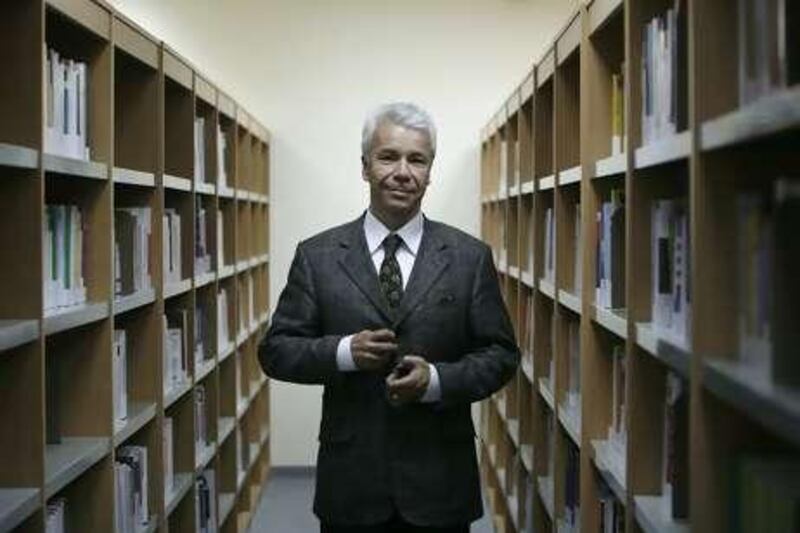The UAE's legal profession will soon start to see ambitious young Emiratis doing work currently undertaken by western firms, a leading specialist in international law has said. Professor Jean-Yves de Carra, who has sat as a judge and arbitrator at the Hague International Tribunal, helped to train Iraqi diplomats and who heads the international law department at the Paris-Sorbonne University in Abu Dhabi, said the western lawyers who advised UAE-based companies on international trade and criminal law would soon start to be replaced by a new generation of young Arab and African lawyers who had been trained in this country.
"In the next five to 10 years, I think you will start to see changes," he said. "The international firms will not leave, but business is growing. Until now in this region there has been no postgraduate degree in international law and very little training for diplomats, so they have had to send people abroad." Local universities, he said, were "very traditional, especially in the legal field. They tend to focus on Sharia law and national needs and, although it is changing, they have not been interested in international law. The reasons for that vary from one state to another, but their international legal needs were, and still are, satisfied by foreign law firms."
While the quality of advice offered by those international firms was high, Professor de Carra said they often adopted an "off the shelf" mentality that meant answers to issues faced by companies in the UAE might simply be imported from other legal systems. "You will get a high-quality answer but it is often very uniform," he said. "It has already been prepared for a similar situation elsewhere, so you don't always get a tailor-made answer or solution to your problem. That is what companies have been telling me, that they would like to have a more localised pool of expertise."
He said the diversification of the nation's economy meant there was a growing need among UAE businesses for international legal expertise. "If you speak to local lawyers, they have the feeling they should take part in this international legal market," he said. "There are some very big local firms that have expanded internationally, but that is quite recent. "The UAE is more and more involved in international markets in all sorts of fields, including finance, air and maritime transport and investment. Dubai, in particular, wants to be a hub for these kinds of activities and compete with places like Hong Kong and Singapore."
That ambition, he said, meant there were increasing opportunities for young Emirati lawyers to make their mark in the global arena. "Companies really need legal skills in those matters, and it is a natural step to want their own national lawyers," he said. "However, young Emiratis who are interested in this will not only want to practise in their own country, they will want the opportunity to practise internationally as well."
In the autumn, the Paris-Sorbonne University is offering a two-year master's programme in international law, which will cover topics including geopolitics, history, international trade and investment, law and the law of the sea. "The time has come where they need this kind of programme," said Professor de Carra. "We will start, but I am sure other universities will do the same. We definitely want to expand from the masters programme to offering doctorates in international law as well."
While many of the students applying for the course are at the beginning of their professional life, a significant number of applications have been received from experienced lawyers and diplomats looking to advance their training and their careers. "A few years ago, I taught a class at The Hague that was entirely comprised of practising lawyers," said Professor de Carra. "It was extremely demanding and very interesting, because each of them had challenging questions and examples that came from their own experience."
The classes in Abu Dhabi will be taught in English by a variety of international experts who will come to the capital for two weeks at a time to lecture on their specialist area. The first year will be a general overview of international law and the second year will be mostly taken up with the dissertation. "For the teachers, this is an exciting opportunity to work in and study an interesting region," Professor de Carra said. "Some are interested because they know the region and others are coming because they want to know."
@Email:gmcclenaghan@thenational.ae






